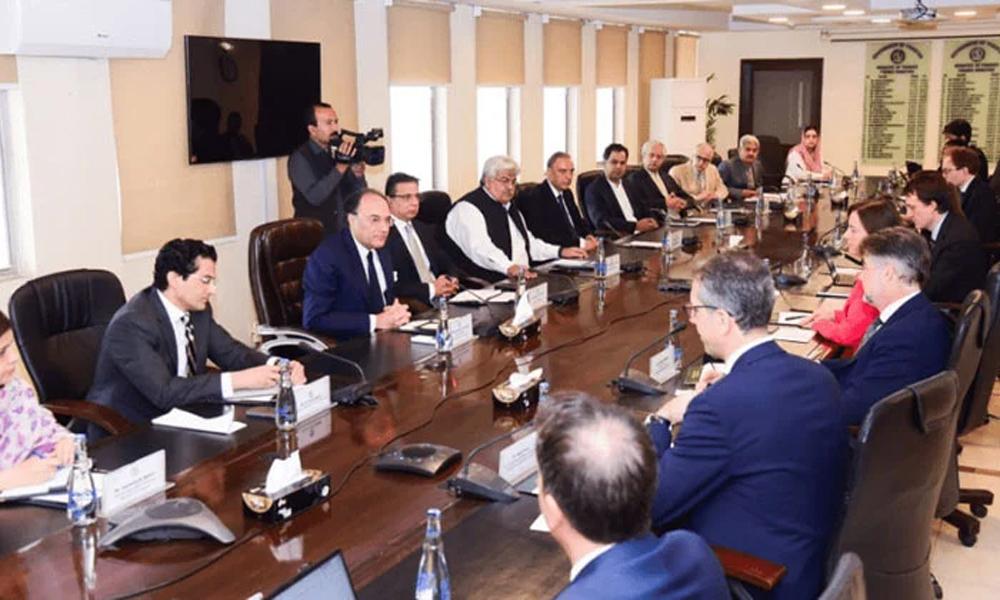There will be no significant savings in budget due to salary cuts


Islamabad: After the International Monetary Fund (IMF) balked at providing substantial relief to the salaried class, real estate, beverages, and export sectors, the crux of the ongoing talks by the visiting IMF team is that it has made the tax collection target of the Federal Revenue Service conditional on a reduction in government expenditure.
The International Monetary Fund team will conclude its visit on Friday (today). Only the defense budget will be exempted, as Islamabad has decided to increase it in view of the current geopolitical situation.
The prime minister and his team met the IMF delegation led by Jihad Azour, Regional Director for the Middle East and Central Asia.
Pakistan has requested to postpone the decision to increase the federal excise duty on fertilizers from 5 to 10 percent and impose a new 5 percent tax on pesticides.
The IMF is expected to partially agree to this request of Prime Minister Shehbaz Sharif.
The increase in salaries and pensions will be negligible as the drive to reduce the number of government employees has now faded, and there will be no significant savings in the budget due to salary cuts.
It is also reported: “We do not understand how the final calculation of the budget estimates will be done”. The government will present the budget in parliament on June 2, after which virtual negotiations will continue.
All conditions will be coordinated with the IMF before the Finance Bill 2025 becomes a law to reduce criticism during the budget approval. However, a senior government official has confirmed that the revenue in the next budget will determine the direction of the economy for the next few years, as the government is busy with its last efforts to convince the IMF to relax income tax rates for the salaried class.
The tax target of the Federal Revenue Service will be kept at over Rs1.4 trillion in the next budget, provided that the Finance Ministry can reduce its expenditure proportionately.
The defense budget will be the only exception in this budget, which will be increased according to the country’s needs. Another opportunity exists for spending cuts, which can be achieved through reducing debt repayments.
The Ministry of Finance and the IMF have estimated Rs8.7 trillion for this purpose, but this estimate could be reduced to Rs8-8.2 trillion.
The IMF has also asked the provinces to reduce their spending and generate more revenue in taxes to keep the overall national deficit in check.
Another government official said that the government has arranged for trade finance assistance of US$1 billion within the current fiscal year (up to June 2025).
Pentagon says Iran will not be ‘endless war’
- ایک دن قبل

Meet the toymaker who helped take down Trump’s tariffs
- 15 گھنٹے قبل
67 Afghan Taliban operatives killed in latest repulsive attacks: Tarar
- 7 گھنٹے قبل
US Marines fired on protesters storming consulate in Karachi, officials say: Reuters
- 7 گھنٹے قبل
Apple launches new generation of MacBook laptops starting at $1,099
- 3 گھنٹے قبل
Global oil and gas shipping costs surge as Iran vows to close Strait of Hormuz
- 2 گھنٹے قبل
Pakistan won’t allow use of neighboring territory to destabilize peace: President
- ایک دن قبل

What does “America First” even mean anymore?
- 6 گھنٹے قبل
Iran war enters fourth day in 'smoke and blood' as markets slide
- 2 گھنٹے قبل
Hockey World Cup Qualifier: Pakistan beat Malaysia to reach semi-finals
- ایک دن قبل

Trump’s Iran war is uniting a strange new anti-war alliance
- 15 گھنٹے قبل

Ultrahuman’s new flagship smart ring has a 15-day battery life
- 8 گھنٹے قبل















